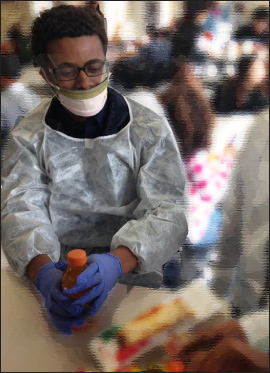No, you are not going to get Ebola

Since the first case of Ebola in the U.S. in September, hysteria has swept through the country. Many people fear an outbreak, despite not even understanding how it’s transmitted. While other just think it’s a joke.
Despite the near constant media attention, some students still don’t see it as that big of a deal.
“I think it’s blown out of proportion,” junior Deangelo Wofford said. “People are panicking, and there’s no reason to panic.”
Wofford says he understands the severity of the illness but doesn’t see it as an imminent threat here in the U.S.
“It’s a very serious disease, but I don’t see why people think you can catch it from just talking to somebody,” he said. “People are almost being prejudice to people that are coming from Africa.”
The Ebola Virus, which has a 70 percent fatality rate, has plagued West African countries like Guinea, Liberia, Nigeria and Sierra Leone for over 30 years. This most recent epidemic has over 4,500 confirmed deaths, according to the Centers for Disease Control and Prevention.
Science teacher Steve Banasiak says students don’t know enough about Ebola.
Despite the media attention and talk from politicians, there is still a lot of misinformation.
“The biggest misconception about Ebola is the risk of getting it,” Banasiak said. “It is difficult to spread comparative to many other illnesses, especially with the facilities and procedures for the sick we have in America.”
Many students, and people all over America, have little idea how Ebola is transmitted.
“You need to have physical contact with the fluids of an Ebola positive individual when they are highly symptomatic (fever, heavy sweating, etc.),” Banasiak said. “If this isn’t you, you shouldn’t be in a panic mode.”
It’s common to hear Ebola jokes in the hallways here or on social media.
Though he does see Ebola as a formidable illness, Wofford still thinks it’s kind of funny.
“I do laugh at (Ebola jokes),” Wofford said.”I feel like if you don’t laugh, then that just makes it even worse.”
However, many students cringe when they hear those kind of jokes. Making light of the Ebola outbreak is the newest social media trend. Young people take to twitter and Instagram to make jokes about the virus and downplay its severity,.
“I think it’s rude,” junior Michelle Maass said. “It’s deadly and you shouldn’t make fun of it because people have actually lost their lives, and people have lost family members because of it.”
Banasiak isn’t offended by Ebola jokes; he thinks that people are just dealing with their fears.
“Ebola jokes about the disease itself can be in bad taste as it is a tragic and lethal illness, however most Ebola jokes I’ve encountered tend to be making light not of the disease but of public and the media’s fearful, often misinformed reaction,”Banasiak said. “People’s strong reaction without information and the lack of public scientific literacy over Ebola right now give me much more concern than the virus itself.”
Many Americans are upset with America’s timing in their aid to Ebola patients.
“I think it’s really serious, but it bothers me how we only find it serious when it’s in America,” Maass said. “Why does it matter now when it’s been in [West Africa] forever?”
Some people critique America’s handling of Ebola, but are glad people are finally paying attention to its looming presence.
“I think we should have taken better precautions,” junior Margaret Danielian said. “Now that it’s here I feel like people are finally starting to realize it.”
Danielian says the Ebola outbreak is a grim issue, and it shouldn’t be taken lightly.
“I think that it is serious,” she said. “People only find it serious when it impacts them.”
Junior Megan Blacher doesn’t understand why so many people joke around when it comes to Ebola.
“I think it’s really unsympathetic to do that,” Blacher said. “These are peoples lives, and you can’t just play with them like that. It’s time to grow up, and it’s time to think about how you would feel if this was your parents or your ancestors dying out there from the disease.”
